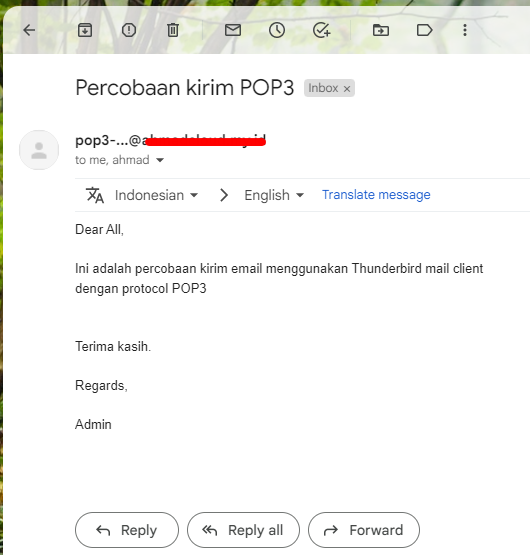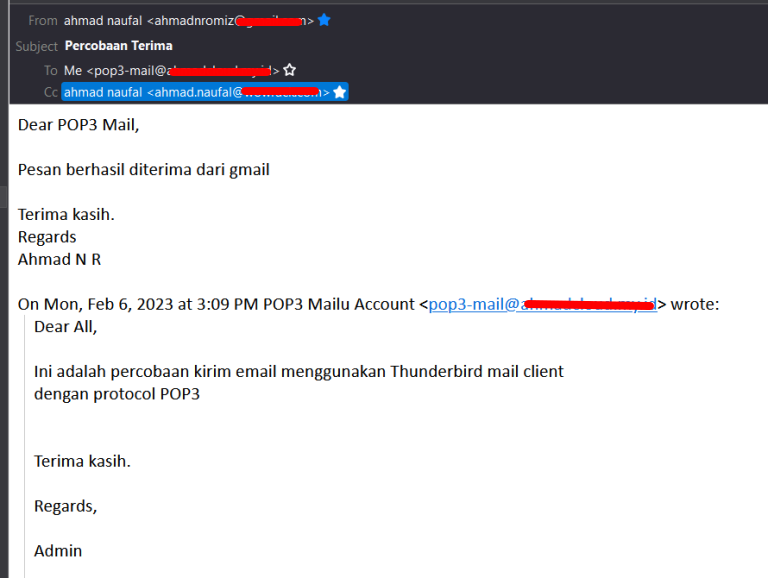Deploy Mailu on Rancher Kubernetes
Mailu is a simple yet comprehensive mail server as a set of Docker images that is very easy to use. Another perk of using Mailu is that it is an open-source mail server, free to use for everyone.
This article will show you the easy deployment step of Mailu on Rancher Kubernetes.
Prerequisite:
- Please enable DNSSEC on your nameserver and add it to your domain registrar (Reff link to enable DNSSEC on CloudFlare nameserver).
- Set up the Rancher Kubernetes cluster or a single node cluster (adjusting your cluster.yml file).
System Preparation:
- OS: Ubuntu 22.04
- Docker Version: 20.10.x
- RAM: 8GB Memory
- vCPU: 6 Core
- Single node host
K8s Environment Set:
1. Install helm and kubectl on the Ubuntu host using the Snap package manager
snap install helm --classic -y && snap install kubectl --classic -y2. Copy the API generated by the RKE (Rancher Kubernetes Engine) Kubernetes cluster to the kubectl config located in /root/.kube/config (create the config file if necessary). Then verify the kubectl connection.

3. Create a new project namespace on your rancher (e.g. mail-server namespace)
4. Deploy longhorn on the related rancher project and set the replica to 1. Depending on the node in the Kubernetes cluster, you might want to increase the replica to the number of worker nodes. The longhorn will be used as the storageclass in Rancher Kubernetes Cluster.
Mailu Installation
- Add the repository via:
helm repo add mailu https://mailu.github.io/helm-charts/- Create a local values file:
helm show values mailu/mailu > values.yaml- Edit the
values.yamlto reflect your environment. The full setup example can be seen in the following code:
# Default values for mailu.
# A list of mail hostnames is required. The first will be used as primary mail hostname
hostnames:
- mailu.example.com # Please use your real domain
# The mail domain is required. See https://github.com/Mailu/Mailu/blob/master/docs/faq.rst#what-is-the-difference-between-domain-and-hostnames
domain: example.com # Please use your real domain
# The secret key is required for protecting authentication cookies and must be set individually for each deployment
# secretKey: chang3m3!
secretKey: chang3m3!
# An initial account can automatically be created:
initialAccount:
username: mailadmin
domain: example.com
password: chang3m3!
nameOverride: ""
fullnameOverride: ""
clusterDomain: cluster.local
nodeSelector: {}
# Tolerations for pod assignment
# Ref: https://kubernetes.io/docs/concepts/configuration/taint-and-toleration/
tolerations: {}
# Affinity for pod assignment
# Ref: https://kubernetes.io/docs/concepts/configuration/assign-pod-node/#affinity-and-anti-affinity
affinity: {}
database:
# type of the database for mailu (sqlite or mysql)
# default database is an embedded sqlite
# for mysql, see settings below
type: sqlite
# type of the database for roundcube (sqlite or mysql)
# default database is an embedded sqlite
# for mysql, see settings below
roundcubeType: sqlite
# For mysql/mariadb use the following config:
# Set the host to use an external database.
# If not host is set, a database instance is created by this chart.
# type: mysql
mysql: {}
# host: external-db-hostname
# root password for mysql database
# rootPassword: chang3m3! # can only be set for embedded mysql
# settings for mailu (required if mailu database type is "mysql")
# database: mailu
# user: mailu
# password: chang3m3!
# For an external PostgreSQL database, use the following config:
postgresql: {}
# host: external-db-hostname
# database: mailu
# user: mailu
# password: chang3m3!
# settings for roundcube (required if roundcube database type is "mysql" or "postgresql")
# roundcubeDatabase: roundcube
# roundcubeUser: roundcube
# roundcubePassword: chang3m3!
external_relay: {}
# host: "[domain.tld]:port"
# username: username
# password: SECRET
# # username and password can also be stored as secret:
# secretName: external-relay-secret
# usernameKey: username
# passwordKey: password
persistence:
# Setings for a single volume for all apps
# set single_pvc: false to use a per app volume and set the properties in <app>.persistence (ex. admin.persistence)
single_pvc: true
size: 70Gi
accessMode: ReadWriteOnce
#annotations:
# "helm.sh/resource-policy": keep
#hostPath: /path/on/the/host
#existingClaim: name-of-existing.claim
#storageClass: "-"
storageClass: "longhorn"
#claimNameOverride: mailu-pvc
# Change this if you're using different address ranges for pods
subnet: 10.42.0.0/16
# Version of mailu docker images to use when not specified otherwise
mailuVersion: 1.9.26
#mailuVersion: 1.8
# default log level. can be overridden globally or per service
logLevel: WARNING
# local part of the postmaster email address (Mailu will use @$DOMAIN as domain part)
postmaster: postmaster
mail:
messageSizeLimitInMegabytes: 50
# Configuration to prevent brute-force attacks. See the documentation for further information: https://mailu.io/master/configuration.html
authRatelimitIP: 60/hour
authRatelimitIPv4Mask: 24
authRatelimitIPv6Mask: 56
authRatelimitUser: 100/day
authRatelimitExemtionLength: 86400
# authRatelimitExemtion:
# Configuration to reduce outgoing spam in case of an compromised account. See the documentation for further information: https://mailu.io/1.9/configuration.html?highlight=MESSAGE_RATELIMIT
messageRatelimit: 200/day
# messageRatelimitExemption:
# certmanager settings
certmanager:
enabled: true
issuerType: ClusterIssuer
issuerName: letsencrypt
apiVersion: cert-manager.io/v1
# Set ingress and loadbalancer config
ingress:
externalIngress: true
tlsFlavor: cert
className: ""
annotations:
nginx.ingress.kubernetes.io/proxy-body-size: "0"
realIpHeader: X-Forwarded-For
realIpFrom: 0.0.0.0/0
# Frontend load balancer for non-HTTP(s) services
front:
# logLevel: WARNING
image:
repository: mailu/nginx
# tag defaults to mailuVersion
# tag: master
resources:
requests:
memory: 100Mi
cpu: 100m
limits:
memory: 200Mi
cpu: 200m
startupProbe:
periodSeconds: 10
failureThreshold: 30
timeoutSeconds: 5
livenessProbe:
periodSeconds: 10
failureThreshold: 3
timeoutSeconds: 5
readinessProbe:
periodSeconds: 10
failureThreshold: 1
timeoutSeconds: 5
# Deployment or DaemonSet
controller:
kind: Deployment
nodeSelector: {}
# Expose front mail ports via hostPort
hostPort:
enabled: true
# Expose front mail ports via external service (ClusterIP or LoadBalancer)
externalService:
enabled: false
type: ClusterIP
# LoadBalancer
# type: LoadBalancer
# loadBalancerIP:
externalTrafficPolicy: Local
annotations: {}
pop3:
pop3: false
pop3s: true
imap:
imap: false
imaps: true
smtp:
smtp: true
smtps: true
submission: true
admin:
# logLevel: WARNING
image:
repository: mailu/admin
# tag defaults to mailuVersion
# tag: master
persistence:
size: 6Gi
storageClass: ""
accessMode: ReadWriteOnce
claimNameOverride: ""
#annotations:
# "helm.sh/resource-policy": keep
resources:
requests:
memory: 500Mi
cpu: 100m
limits:
memory: 500Mi
cpu: 100m
podAnnotations: {}
startupProbe:
periodSeconds: 10
failureThreshold: 30
timeoutSeconds: 5
livenessProbe:
periodSeconds: 10
failureThreshold: 3
timeoutSeconds: 5
readinessProbe:
periodSeconds: 10
failureThreshold: 1
timeoutSeconds: 5
redis:
image:
repository: redis
tag: 5-alpine
persistence:
size: 6Gi
storageClass: ""
accessMode: ReadWriteOnce
claimNameOverride: ""
#annotations:
# "helm.sh/resource-policy": keep
resources:
requests:
memory: 200Mi
cpu: 100m
limits:
memory: 300Mi
cpu: 200m
startupProbe:
periodSeconds: 10
failureThreshold: 30
timeoutSeconds: 5
livenessProbe:
periodSeconds: 10
failureThreshold: 3
timeoutSeconds: 5
readinessProbe:
periodSeconds: 10
failureThreshold: 1
timeoutSeconds: 5
postfix:
# logLevel: WARNING
image:
repository: mailu/postfix
# tag defaults to mailuVersion
# tag: master
containerSecurityContext: {}
# CRI-O users will need to add the following:
# capabilities:
# add:
# - SYS_CHROOT
persistence:
size: 6Gi
storageClass: ""
accessMode: ReadWriteOnce
claimNameOverride: ""
#annotations:
# "helm.sh/resource-policy": keep
resources:
requests:
memory: 2Gi
cpu: 500m
limits:
memory: 2Gi
cpu: 500m
startupProbe:
periodSeconds: 10
failureThreshold: 30
timeoutSeconds: 5
livenessProbe:
periodSeconds: 10
failureThreshold: 3
timeoutSeconds: 5
readinessProbe:
periodSeconds: 10
failureThreshold: 1
timeoutSeconds: 5
dovecot:
enabled: true
# logLevel: WARNING
image:
repository: mailu/dovecot
# tag defaults to mailuVersion
# tag: master
containerSecurityContext: {}
# CRI-O users will need to add the following:
# capabilities:
# add:
# - SYS_CHROOT
persistence:
size: 6Gi
storageClass: ""
accessMode: ReadWriteOnce
claimNameOverride: ""
#annotations:
# "helm.sh/resource-policy": keep
resources:
requests:
memory: 500Mi
cpu: 500m
limits:
memory: 500Mi
cpu: 500m
startupProbe:
periodSeconds: 10
failureThreshold: 30
timeoutSeconds: 5
livenessProbe:
periodSeconds: 10
failureThreshold: 3
timeoutSeconds: 5
readinessProbe:
periodSeconds: 10
failureThreshold: 1
timeoutSeconds: 5
# enable dovecot overrides
# overrides:
# dovecot.conf: |
# # More info here: https://mailu.io/1.8/kubernetes/mailu/index.html#dovecot
# mail_nfs_index = yes
# mail_nfs_storage = yes
# mail_fsync = always
# mmap_disable = yes
# mail_max_userip_connections=100
# historically rspamd and clamav shared their volumes in this chart
# this isn't needed anymore. to maintain backward compatibility and give users
# some time to migrate we keep this here.
#
# if you want a "shared" volume keep in mind you have to use affinity rules on
# rspamd and clamav pods so that both pods are scheduled on the same node
# to keep RWO volumes working
#
# otherwise set rspamd_clamav_persistence.single_pvc to true and review
# rspamd.persistence and clamav.persistence
rspamd_clamav_persistence:
size: 6Gi
storageClass: ""
accessMode: ReadWriteOnce
claimNameOverride: ""
single_pvc: false
#annotations:
# "helm.sh/resource-policy": keep
rspamd:
# logLevel: WARNING
image:
repository: mailu/rspamd
# tag defaults to mailuVersion
# tag: master
persistence:
size: 1Gi
storageClass: ""
accessMode: ReadWriteOnce
claimNameOverride: ""
#annotations:
# "helm.sh/resource-policy": keep
resources:
requests:
memory: 300Mi
cpu: 300m
limits:
memory: 300Mi
cpu: 300m
startupProbe: # give it 15 minutes for initial rule compilation
periodSeconds: 10
failureThreshold: 90
timeoutSeconds: 5
livenessProbe:
periodSeconds: 10
failureThreshold: 3
timeoutSeconds: 5
readinessProbe:
periodSeconds: 10
failureThreshold: 1
timeoutSeconds: 5
clamav:
enabled: true
# logLevel: WARNING
image:
repository: mailu/clamav
# tag defaults to mailuVersion
# tag: master
persistence:
size: 2Gi
storageClass: ""
accessMode: ReadWriteOnce
claimNameOverride: ""
#annotations:
# "helm.sh/resource-policy": keep
resources:
requests:
memory: 1Gi
cpu: 1000m
limits:
memory: 2Gi
cpu: 1000m
startupProbe: # give it 10 minutes for initial freshclam update
periodSeconds: 10
failureThreshold: 60
timeoutSeconds: 5
livenessProbe:
periodSeconds: 10
failureThreshold: 3
timeoutSeconds: 5
readinessProbe:
periodSeconds: 10
failureThreshold: 1
timeoutSeconds: 5
# clamav must share a volume with rspamd. This is usually enforced by the volume itself (RWO). If you use RWM volumes and want to
# have clamav running on the same node, add the following affinity rule:
# affinity:
# podAffinity:
# requiredDuringSchedulingIgnoredDuringExecution:
# - labelSelector:
# matchExpressions:
# - key: component
# operator: In
# values:
# - rspamd
# topologyKey: kubernetes.io/hostname
roundcube:
enabled: true
# logLevel: WARNING
image:
repository: mailu/roundcube
# tag defaults to mailuVersion
# tag: master
persistence:
size: 6Gi
storageClass: ""
accessMode: ReadWriteOnce
claimNameOverride: ""
#annotations:
# "helm.sh/resource-policy": keep
uri: /roundcube
resources:
requests:
memory: 100Mi
cpu: 100m
limits:
memory: 200Mi
cpu: 200m
startupProbe:
periodSeconds: 10
failureThreshold: 30
timeoutSeconds: 5
livenessProbe:
periodSeconds: 10
failureThreshold: 3
timeoutSeconds: 5
readinessProbe:
periodSeconds: 10
failureThreshold: 1
timeoutSeconds: 5
webdav:
enabled: false
# logLevel: WARNING
image:
repository: mailu/radicale
# tag defaults to mailuVersion
# tag: master
persistence:
size: 6Gi
storageClass: ""
accessMode: ReadWriteOnce
claimNameOverride: ""
#annotations:
# "helm.sh/resource-policy": keep
startupProbe:
periodSeconds: 10
failureThreshold: 30
timeoutSeconds: 5
livenessProbe:
periodSeconds: 10
failureThreshold: 3
timeoutSeconds: 5
readinessProbe:
periodSeconds: 10
failureThreshold: 1
timeoutSeconds: 5
mysql:
image:
repository: library/mariadb
tag: 10.4.10
persistence:
size: 6Gi
storageClass: ""
accessMode: ReadWriteOnce
claimNameOverride: ""
#annotations:
# "helm.sh/resource-policy": keep
resources:
requests:
memory: 256Mi
cpu: 100m
limits:
memory: 512Mi
cpu: 200m
startupProbe:
periodSeconds: 10
failureThreshold: 30
timeoutSeconds: 5
livenessProbe:
periodSeconds: 10
failureThreshold: 3
timeoutSeconds: 5
readinessProbe:
periodSeconds: 10
failureThreshold: 1
timeoutSeconds: 5
fetchmail:
enabled: false
# logLevel: WARNING
image:
repository: mailu/fetchmail
# tag defaults to mailuVersion
# tag: master
persistence:
size: 6Gi
storageClass: ""
accessMode: ReadWriteOnce
claimNameOverride: ""
#annotations:
# "helm.sh/resource-policy": keep
resources:
requests:
memory: 100Mi
cpu: 100m
limits:
memory: 200Mi
cpu: 200m
delay: 600
Key Takeaways
There are three keys that are required to be fulfilled.
Those are the hostname, the domain name, secret key, and the initial account.
# A list of mail hostnames is required. The first will be used as primary mail hostname
hostnames:
# - mail.example.com
# - imap.example.com
- mailu.example.com # Please use your real domain
# The mail domain is required. See https://github.com/Mailu/Mailu/blob/master/docs/faq.rst#what-is-the-difference-between-domain-and-hostnames
domain: example.com # Please use your real domain
# The secret key is required for protecting authentication cookies and must be set individually for each deployment
# secretKey: chang3m3!
secretKey: chang3m3!
# An initial account can automatically be created:
initialAccount:
username: mailadmin
domain: example.com # Please use your real domain
password: chang3m3!
References:
Functionality Test
- IMAP Sending and Receiving test
Webmail


Thunderbird Mail Client


- POP3 Sending and Receiving Test


Conclusion
There you have deployed a mail server based on a container environment. Now, you have a mail server that has been engaged with future DevOps environments. If you have further questions regarding this tutorial, freely put the questions in the comment section below.
Check other tutorials that might benefit you on our knowledge base,

